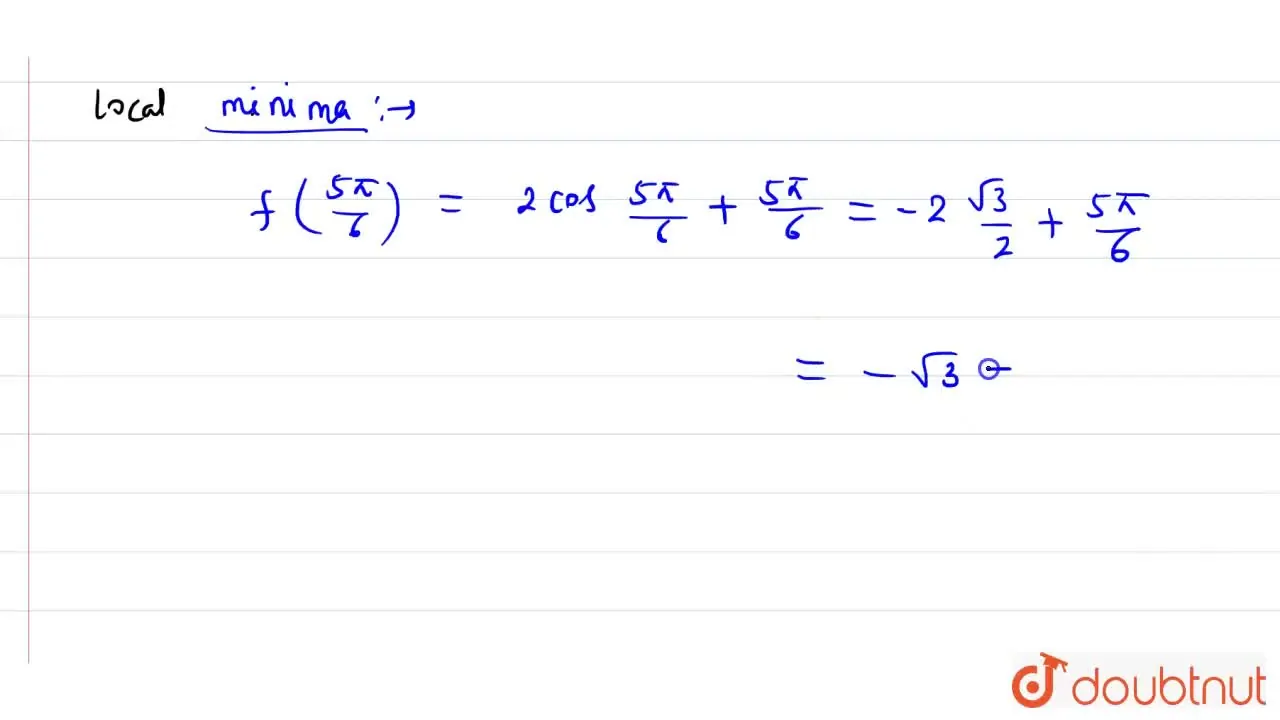Find the local maxima and local minima of the functions:
(i) f(x)=(sinx−cosx), When 0<x<π2
(ii) f(x)=(2cosx+x), when 0<x<π
(i) f(x)=(sinx−cosx)
∴F'(x)=(cosx+sinx)andf''(x)=(−sinx+cosx)
Now, f'(x)=0⇒cosx+sinx=0
⇒tanx=−1⇒x=3π4or7π4
Thus, x=3π4andx=7π4 are the candidates for local maxima or local minima.
Case I When x=(3π/4)
f''(3π4)=(−sin3π4+cos3π4)=(−1√2−1√2)=−2√2
=−√2<0
So, x=(3π/4) is a point of local maximum.
Local maximum value =f(3π4)=√2
Case II Wehn x=(7π/4)
f''(7π4)=f''(−sin 7π4+cos7π4)=(sin π4+cosπ4)
=√2>0
So, x=(7π/4) is a point of local minimum.
Local minimum value =f(7π4)=sin 7π4−cos 7π4
=(−sinπ4−cosπ4)=−√2
(ii) f(x)=(2cosx+x)
∴f'(x)=(−2sinx+1)andf''(x)=−2cosx
Now, f'(x)=0⇒−2sinx+1=0
⇒sinx=12⇒x=π6orx=5π6 in [0,π]
Thus, x=(π/6)andx=(5π6) are the candidates for local maxima or local minima.
Case I When x=(π/6)
We have f''(π6)=−2cos π6=(−2×√32)=−√3<0
∴x=(π/6) is a point of local maximum.
Local maximum value =f(π6)=(√3+π6)
Case II When x=(5π/6)
We have f''(5π6)=−2cos 5π6=2cos π6=2×√32=√3>0
So, x=(5π/6) is a point of local minimum.
Local minimum value =f(5π6)=(5π6−√3)
Related Playlists
- BOOK - RS AGGARWALCHAPTER - APPLICATIONS OF DERIVATIVESEXERCISE - Exercise 11A21videos
APPLICATIONS OF DERIVATIVES
- BOOK - RS AGGARWALCHAPTER - APPLICATIONS OF DERIVATIVESEXERCISE - Exercise 11B17videos
APPLICATIONS OF DERIVATIVES
- BOOK - RS AGGARWALCHAPTER - ADJOINT AND INVERSE OF A MATRIXEXERCISE - Exercise 737videos
ADJOINT AND INVERSE OF A MATRIX
- BOOK - RS AGGARWALCHAPTER - AREA OF BOUNDED REGIONS EXERCISE - Exercise 1739videos
AREA OF BOUNDED REGIONS
Similar Questions
Find the point of local maxima or local minima of the function
f(x)=(sin4x+cos4x) in 0<x<π2View SolutionFind the local maxima and local minima of the functions:
(i) f(x)=sin2x, when 0<x<π
(ii) f(x)=(sin2x−x), when −π2≤x≤π2View SolutionFind e local maximum and local minima, of the function f(x)=sinx−cosx,0<x<2π
View SolutionFind the local maxima or local minima, if any, of the function f(x)=sinx+cosx, 0<x<π2 using the first derivative test.
View SolutionFind the local maxima and local minima, and the corresponding local maximum and local minimum values of the following functions:
(i) f(x)=x√1−x, where x>0
(ii) f(x)=x(x−1)(x−4), where 1<x<4View SolutionFind the maximum and minimum values of the function f(x)=x+sin2x,(0<x<π).
View SolutionThe function f(x) =(sinx)+[cosx],0<x≤π/2
View SolutionFind the maximum and minimum values of the function f(x)=sinx1+tanx,(0<x<2π).
View SolutionIf 0<x<π2, then (sin x + cosec x) is
View SolutionThe function f(x)=1+x(sinx)[cosx],0<x≤π2 (where [.] is G.I.F.)
View Solution


